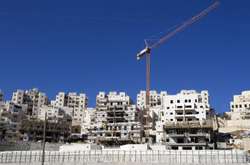NOVANEWS
Avigdor Lieberman says Palestinian prosperity, Israeli security must be ensured before peace deal is finalized
French President Francois Hollande said in an interview aired Wednesday that the Palestinian demand that Israel recognize the right of return makes no sense. Speaking to French-Jewish radio Radio J during his flight back to Paris after a three-day visit to Israel and the West Bank, Hollande said Israel could never agree it.
“The right of return is part of the negotiations, but we cannot ask Israel to accept refugees, all refugees , it would not make sense,” said Hollande. “It would not be accepted by the Israelis.”
The highly sensitive issue of the Palestinian demand that Israel recognize the right of Palestinian refugees who left Israel during the 1948 War of Independence and their descendent to return to their homes came up during Hollande’s visit to Ramallah on Monday, where according to Ha’aretz, Hollande suggested the Palestinian leadership “show flexibility” on the issue in return for Israel halting construction in the West Bank.
During an official meeting with Palestinian President Mahmoud Abbas, Hollande said Israel must halt all settlement building in the West Bank, saying it hampers the chances for a peace agreement with the Palestinians. Reiterating his country’s support for a two-state solution to the Israeli-Palestinian conflict, Hollande also said that Jerusalem could serve as a capital for both Israel and a future Palestinian state.
He added, however, that his talks with the Israeli Prime Minister Benjamin Netanyahu made clear the issue of the right of return represents a concern for the Israeli side.

Speaking at a conference in Sderot on Tuesday, Israel’s Foreign Minister Avigdor Lieberman said that before a dioplomatic solution could be finalized with the Palestinians, the Palestinian Authority’s economy must be strengthened.
“They’re trying to force peace,” said Lieberman. “But you can’t talk about a diplomatic solution before talking about the economy and security.” Lieberman suggested that peace could only be on the table once the Palestinian GDP rose to $10,000.
Lieberman also said that Palestinian Authority President Mahmoud Abbas does not represent the Palestinian people and their will.
In response to Lieberman’s statement, Meretz party chairwoman Zehava Gal-on charged the Israeli government with speaking in two voices. “There are two governments within the same coalition, the ‘fig leaf’ government and the Kamikaze government,” she said.
A UN political chief said Tuesday that peace talks between the Palestinians and Israelis are at a critical stage, and warned that recently announced Israeli settlement-building plans “cannot be reconciled” with a two-state solution which may be “irreparably damaged” as a result.
Under-Secretary-General for Political Affairs Jeffrey Feltman said talks have “gone some way to narrowing differences,” but said failure to achieve a resolution “would be dire,” adding that “strains have been growing dangerously” between both sides.
In a United Nations Security Council meeting on the Middle East, Feltman cautioned: “the consequences of failure would be dire for Israelis and Palestinians alike. We thus continue to urge the parties to remain steadfast in their commitment to see this process through but we fear that unless steps are taken to prevent the recurrence of negative developments such as those of recent weeks, the remaining chances to achieve a negotiated two-state solution may be irreparably damaged.”
Feltman was referring to the plans announced by Israel earlier this month to build more settler homes in the disputed West Bank and East Jerusalem.
“We have been following with growing concern those critical developments, especially the announcement on 13 November of plans for advancement of some 24,000 units, including in [highly sensitive swathe of land] E-1 which cannot be reconciled with the goal of a negotiated two-state
solution,” said Feltman
.
This highly contentious area of the West Bank forms a corridor to the east of Jerusalem that the Palestinians say would carve the West Bank in two and effectively destroy any chance of a contiguous state.
Last week, Israeli Prime Minister Benjamin Netanyahu froze the plans to build the new settler homes in E-1, although plans for new settlements units in other disputed areas of the West Bank remain in place.
During the meeting, Feltman reiterated the UN view that a negotiated two-state solution is the only way to achieve lasting peace and urged all parties not to take any actions that could jeopardize that goal.
He added that Secretary-General Ban Ki-moon “has reiterated the United Nations’ unequivocal position that settlements are contrary to international law and are an obstacle to peace.”
Feltman said that Palestinian negotiators have submitted their resignations in protest at the settlement expansion announcements. They are now under consideration by Palestinian President Mahmoud Abbas — who earlier this week described settlements as “the greatest threat that could end the peace process and lead to its failure.”
Feltman also expressed deep concern over the deteriorating situation in the Hamas-ruled Gaza Strip, where there is renewed violence and worsening economic and humanitarian conditions.
He cited the regular violence between settlers and Palestinians throughout the West Bank, the recent attack on an Israeli soldier who was stabbed to death, and the fact that Israeli security forces had carried out over 350 search-and-arrest operations in the past month.
Palestinians fear Israel’s settlements in areas it captured in the 1967 Middle East war will deny them a viable state. Most countries consider the enclaves illegal under international law. The United States describes the settlements as illegitimate.
Israel cites historical and biblical links to the West Bank and East Jerusalem, where more than 500,000 Israelis now live alongside 2.5 million Palestinians.



